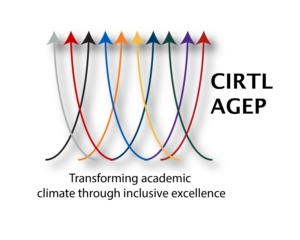
CIRTL AGEP is a “Networked Improvement Community” (NIC) focused on improving dissertator experiences with the goal of creating a more inclusive environment for graduate students.
The climate that our graduate students experience needs to be more than inclusive, it needs to deeply value the diverse perspectives and experiences that a broad range of students bring to their graduate work on our world’s toughest challenges. Yet all too often, our graduate programs are set up for majority populations and minoritized students can have negative experiences from both their advisor and graduate peers. As a result, underrepresented students’ interest in faculty careers plummets approximately 50% more than for majority graduate students (Gibbs, McGready, Bennett, & Griffin, 2014).
To make the climate in graduate programs more inclusive and valuing, Iowa State University, Boston University, Cornell University, Howard University, Michigan State University, Northwestern University, University of Buffalo, University of Georgia, University of Maryland College Park, and the University of Texas at Arlington are collaborating to develop, build and test the impact of a model of a “Networked Improvement Community” (NIC) focused on improving graduate climate. The goal is to reduce the effect of negative climate on interest in faculty careers. The project was submitted in response to the NSF’s Alliances for Graduate Education and the Professoriate (AGEP) program solicitation (NSF 16-552).
Within the CIRTL AGEP NIC we have agreed on shared goals and developed a working theory of improvement, where the hypothesis is if we can make progress on the main causes for interest in faculty careers we will achieve our project goal. These causes include the climate of the program or lab, identity development and self-efficacy, beliefs about a faculty career, faculty members’ attitudes and behaviors, and sense of belonging. The initiatives we and our partners are undertaking to improve these drivers is shown in the table below, with solutions for graduate peers and for faculty. The NIC has also agreed to common metrics, shared in the development of first interventions for faculty and graduate peers across NIC campuses, conducted rapid improvement cycles local to each campus, and completed two annual Plan-Do-Study-Analyse (PDSA) cycles across the entire NIC.
| Graduate Peer Solution Driver | Faculty Solution Driver |
|---|---|
| Provide workshops on peer inclusion | Assist faculty in discussing realities of faculty careers |
| Offer team building training or events | Increase access to multiple mentors (near-peer to senior, from a range of organizations) |
| Encourage development of access to mentors (faculty, alumni, & members of national organizations) | Provide inclusion workshops & leadership training to improve understanding of implicit bias, microaggressions, and importance of cultural identity |
| Prepare advanced graduate students as peer mentors | Improve faculty & postdoc student-centered advising / mentoring through professional development to conduct inclusive research meetings |
| Provide coaching / advocacy | Provide faculty with resources to assist students on transition, identity development, socialization, retention, and completion |
| Provide / assist in obtaining resources | |
| Improve representation of graduate students in groups influencing graduate education | |
| Provide Third Spaces |
Each campus has agreed to the same learning outcomes for its interventions, and each is delivering interventions differently to meet the needs within the local environment. This is a strength of the NIC since the interventions improve since multiple universities are sharing what works (or does not work) on their campus at the same time. The improvement cycles are also informed by common assessments. The interventions aim to increase faculty, postdoc, and graduate peer understanding of social identities, the lived experiences of minoritized graduate students, power and privilege, and mitigating implicit bias and micro-aggressions. Some universities in the NIC are more directly developing skills faculty can use with graduate students such as culturally responsive mentoring and holistic admissions.
As the NIC has matured and programs have been implemented, we have learned that there is a need for multiple local campus partners such as the graduate college or the university’s central diversity and inclusion office. These complement the positional roles of NIC campus leaders and have helped with local implementation.
Evaluation will be done by a team from Michigan State University led by Dr. Marilyn Amey. Integrated research is built into the collaborative process. Research questions will address 1) student descriptions of engagement with their departments and disciplines, 2) which experiences and relationships are most influential in strengthening students’ interest in faculty careers, and 3) how peers and external supports influence sense of community for graduate students.
For more information please visit https://cirtlagep.net/.
Collaborative Award Name (Full): Improved Academic Climate for STEM Dissertators and Postdocs to Increase Interest in Faculty Careers
Awarding Organization: National Science Foundation (NSF)
Dates: 10/1/16 – 9/30/22
Award Number(s): 1646810, 1646869, 1646977, 1647021, 1647094, 1647104, 1647119, 1647121, 1647146, 1647181
Collaborative Partners: Boston University, Cornell University, Howard University, Iowa State State University, Michigan State University, Northwestern University, University at Buffalo, University of Georgia, University of Maryland, College Park, University of Texas, Arlington
